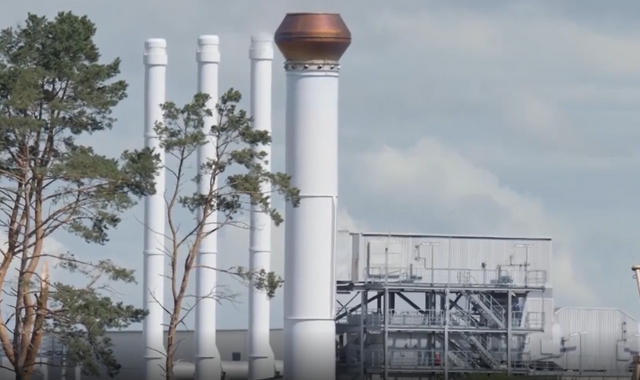Concern about energy-saving measures in Germany as it feels bite of Russian gas reliance

Under Cologne's morning sunshine, Nicole Metzinger is relentlessly swimming up and down the outdoor pool at Stadionbad.
It is the city's largest outdoor swimming complex - an Olympic-sized pool, diving boards and a family pool. But right now, Nicole has the place to herself.
And why? Well perhaps because these days, the water is just a bit less inviting. Jump in, and you'll notice it's colder.
The temperature has been turned down, in order to save energy.
Nicole, a regular distance swimmer, is relaxed about the chill. "I like it cold," she tells me.
"The summer is too hot for me. But I know other people are not so happy with this."
Turning down the pool temperature is one of a string of measures that are being introduced across this city to reduce the amount of energy being used.
Street lights are being dimmed after 11pm. Prominent buildings won't be lit up and a publicity campaign will tell the locals how they can trim their own consumption.
So far, so friendly. It's hard to get angry about turning down the floodlights on the town hall.
But drive 10 minutes out of town, and you can see how Germany's reliance on Russian gas is coming back to bite this nation.
Here, there are streets edged by neat, tidy blocks of flats built for lower-income residents. And the boilers are now being adjusted.
At night, it won't be quite as warm for the residents.
When they turn out their lights, the heating will be fading away as well.
We meet Nazmiye Akkamis, who's 83 years old and living with Alzheimer's.
She is being pushed down the street by her two daughters, Gull and Binnaz, both of them concerned about what sort of impact will be caused by the energy-saving measures.
"Our mother needs it warm, especially in winter," says Gull.
"She is very old, spends a lot of time sitting in the apartment and likes to have it warm. The price of energy, the limit has already been reached, the costs will further increase."
Binnaz nods: "My mother, all of us, are worried about what's going to happen. Just those thoughts and uncertainty. That scares us."
Read more:
Energy bills could hit £500 for January alone, experts warn
UK gas costs surge due to Europe supply crunch and market expert predicts worse to come
What seems to unite this country now is that sense of anxiety.
Germany is accustomed to the feeling of solidity and assuredness that comes with being Europe's economic and political leader.
Now, it seems as if it's suddenly having to feel its way forward.
It's not hard to see why. For years, Germany's energy policy revolved around three things - phasing out nuclear power stations, persisting with coal, and importing gas from Russia.
It is the last of these that is now causing such pain. The flow of gas through the Nord Stream pipeline, which links Russia and Germany, has slowed to just 20% of capacity.
Few outside the Kremlin have any idea when and whether the flow will increase, stay the same or simply come to a halt.
So Germany is scrambling to end its reliance on Russian gas, and that leads to that infectious mood of uncertainty.
Paul Wieland lives near Nazmiye Akkamis. He's friendly and welcoming, blessed with an open smile, but he's also worried.
"Our government has made itself too dependent on various countries," he tells me. "And this is now the big problem we're facing. We are dependent on them and now we have to pay for it."
He says he will cope with the heating restrictions by using a "warm, heavy blanket" and then says that if it becomes a problem he will buy an electric heater.
Except, as we tell him, the rules say he won't be allowed to use the heater. Paul simply shrugs and smiles.
"Let's see what actually happens," he says.
The Greens are in power in Germany, as part of a coalition government that is now grappling with an energy crisis.
The party has long campaigned for a huge increase in renewable energy; now it is part of a government that is turning, once more, to coal and oil to ensure the lights stay on.
And that is the challenge facing this mighty, wealthy, industrial nation of more than 83 million people - how to satisfy the needs of both households and companies.
If energy has to be truly, painfully rationed - where will the balance fall? A question that, so far, has no answer.
And while we're on questions - how long until Germany comes to terms with the fact that its decision to rely on Russia for its gas was a diplomatic gamble that went horribly, embarrassingly wrong?
And can Europe's economic powerhouse really be seen to lean on coal as its fallback answer?
Watch the Daily Climate Show at 3.30pm Monday to Friday, and The Climate Show with Tom Heap on Saturday and Sunday at 3.30pm and 7.30pm.
All on Sky News, on the Sky News website and app, on YouTube and Twitter.
The show investigates how global warming is changing our landscape and highlights solutions to the crisis.

 Yahoo News
Yahoo News 
